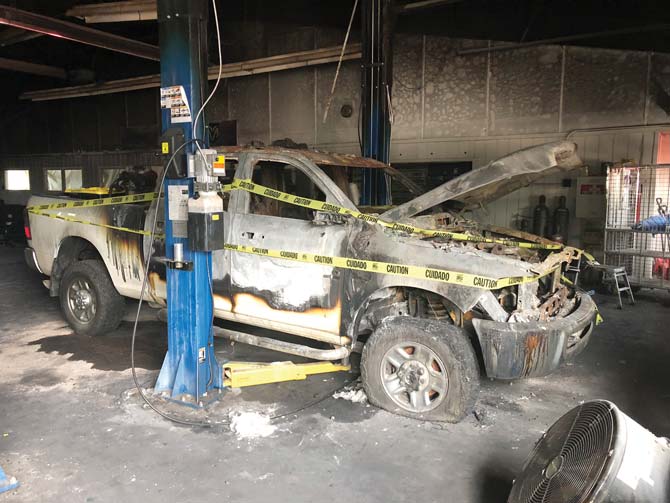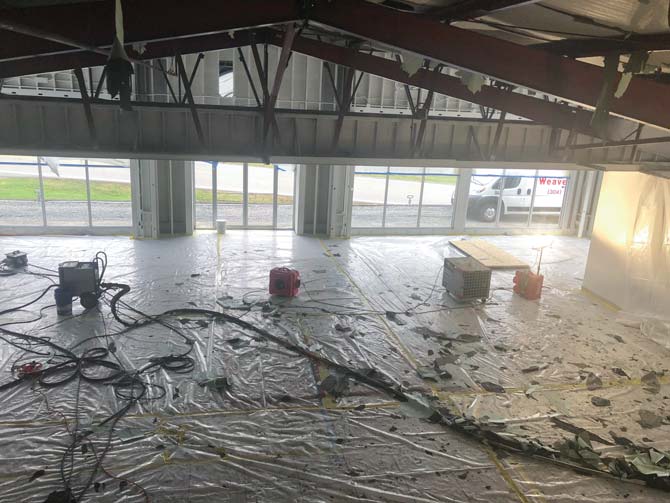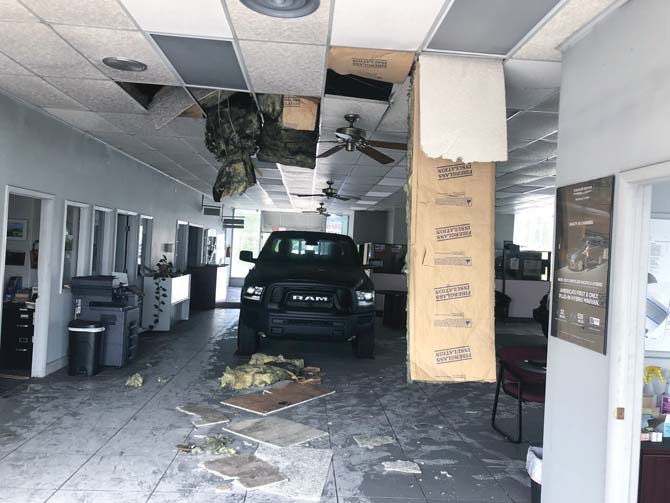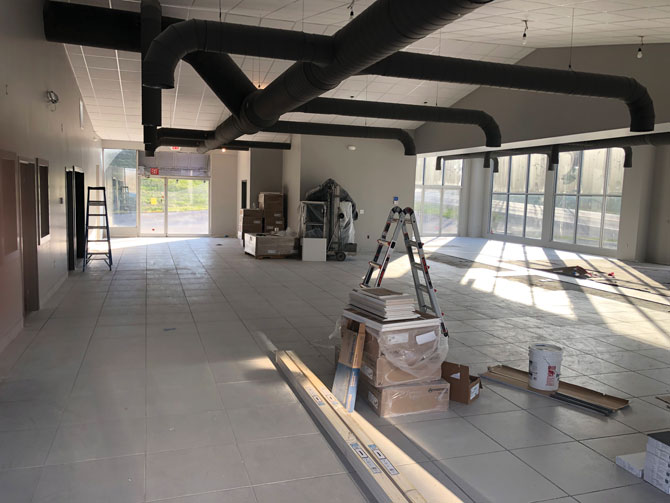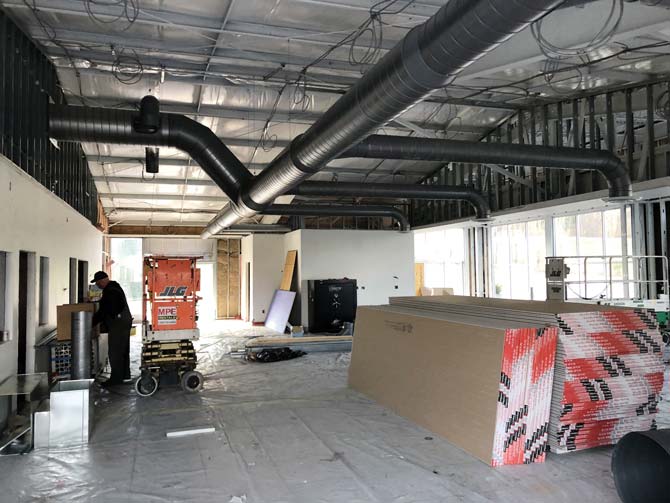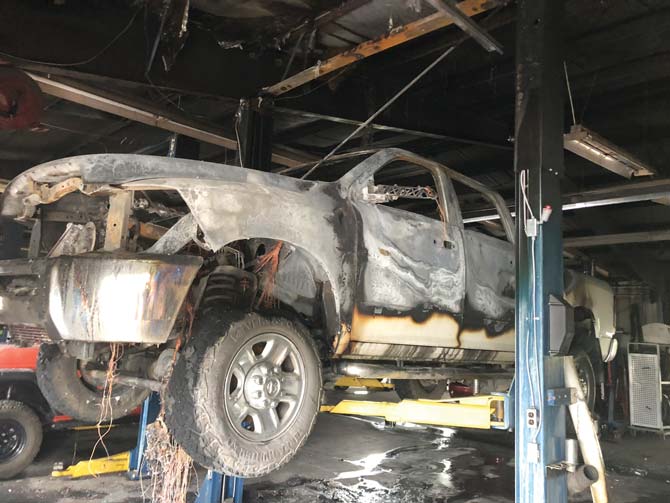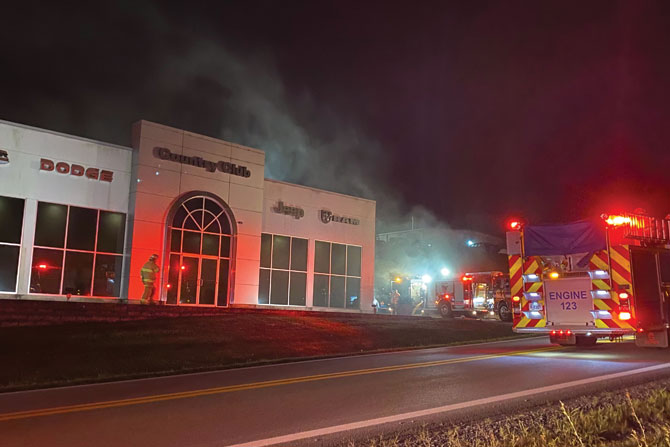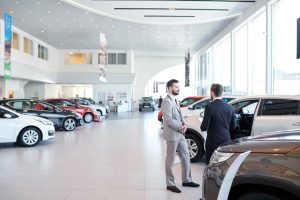Above Photo Credit: WBOY 12 News
On Aug. 19, 2021, a fire started in the service department at Country Club Chrysler Dodge Jeep Ram at approximately 10:30 p.m. WVADA recently spoke with Jack Stewart, the owner and president, about the fire. Jack’s dealership is still recovering, and full recovery probably won’t happen until August 2022. He spoke about lessons learned from the fire and recommendations for other dealers.
The fire started in a Ram 2500 diesel pickup truck with two disconnected batteries. It was up on a lift because service mechanics had been working on it. They had disconnected the batteries because that was the proper procedure for their work on the truck.
A passerby saw smoke coming out of the building and dialed 911. Several fire departments responded. “They were probably there by 10:45 p.m., and they stayed until about 3 a.m.,” Jack said. “It didn’t take them long to put out the fire, but they had a lot of checking to do because of the heat to make sure it hadn’t spread anywhere else. I live 75 miles away, and when I got to the dealership, I thought we were fine. The fire departments had done a good job and contained the fire just to the area where the fire was. The next day, the fire marshall and the insurance adjuster came to see the damage in the daylight, and we saw that smoke had destroyed the whole interior of the building. There was even smoke on the paperwork in the safe. We ended up replacing everything except the outside walls. We even replaced the metal roof and the insulation against it.”
Approximately 20 investigators spent a whole day looking for clues about what happened, but the investigation’s results were inconclusive. “The truck belonged to a contractor, and he had some power tools in the cab. It’s possible lithium batteries might have powered them. If so, the batteries might have been responsible, but the experts could not determine the fire’s origin because it was so hot that it melted everything in the truck’s cab,” said Jack.
Jack had adequate insurance coverage, but he doesn’t know how he could have been better prepared than he was. He said, “Maybe the economy could cause a problem, but I don’t know what physical disasters besides fire could affect us. We were careful, so I didn’t think a fire was likely. We aren’t in a flood zone either, other than from a tornado. There are no wildfires or earthquakes in West Virginia, and forest fires here don’t burn buildings.”
When the fire did happen, the dealership’s building was vulnerable. “The original building was probably built in the 1960s, and it is almost the size of a football field,” said Jack. “It didn’t have a sprinkler system or firewalls because those weren’t required when it was built. It still doesn’t have a sprinkler system because the state doesn’t require them unless you have 300 people in the building at the same time, and installing one would be too expensive. However, we’ve put up firewalls between different sections. We’ve also installed fireproof doors. Maybe it won’t be as serious if it happens again. But how do you protect against smoke getting in the safe?”
Fortunately, Jack had a preowned lot with a nice-sized building about a mile away from the dealership. “My employees did a very good job,” said Jack. “We had to get new computers, hook them all up, and get cars on the lot so we could do business. We were up and running in less than a week, even though parts were everywhere. They still are. We have two service people at a desk instead of a counter. We’re making it work.”
By the middle of April 2022, the dealership was still operating out of the temporary location while employees worked hard to take care of customers. The remaining to-do list included finishing the showroom and the back rooms, replacing all the furniture and building some shelving. Jack thinks the sales department can probably move into the front of the building sometime in May. Once all the remaining tasks are done, it will probably be June, and the rest of the sales department, the parts department and the service desk can move back in. Finishing the service department will take an additional two months.
“It has been really chaotic, and we are not even close to normal,” said Jack. “It will probably be August again by the time we are back in our building and operating normally. We usually have 18 lifts, but we currently have only two mechanics working on one lift to take care of people’s warranty problems. We want to help customers, and I want to keep my employees. Still, it has been an unprofitable time for the company. Things will be more organized after we are back in the building, but we will only have one lift for a while.”
Jack dislikes layoffs, but the service department has lost money month in and month out. “Layoffs are the hardest part of my job. I am up all night when I have to let someone go, and then I have the whole 75-mile drive to think about it. I kept as many people as I could, and some quit because they didn’t want to go through the stress of the recovery process, but I had to lay off a handful.”
Recovering from the fire could cost more than the insurance coverage Jack had. (He had nothing to cover lost wages, but he had lost-income insurance.) Figuring out the money has been complicated by the pandemic; in a normal year, companies look at what happened the previous year. That isn’t possible in this case because 2020 wasn’t a normal year. “So far, my insurance company has been very good,” said Jack. “But we haven’t determined the final amount of compensation yet. My accountant will have to get together with the insurance company’s accountant and come to an agreement.”
As Jack thought about his fellow dealers, he said, “I hope that all my fellow dealers understand the risks and take the necessary precautions. Dealers should be prepared and make sure they have all their bases covered. That means having adequate insurance and preventing safety issues in the garage. There are many things you can do wrong, and you need to do your best to prevent a fire by looking at those issues first, but we didn’t do anything wrong, and we still had a fire. Make sure you have sufficient insurance coverage. You don’t want to find out you were underinsured when something happens.” He likes lost-income insurance because “disasters can cause a lot of lost income.”
Jack is especially concerned about the potential for fires from electric vehicles, particularly if they are charging inside a garage. “We could see more fires that will be caused by electric vehicles. They are new, and they are supposed to be safe, but when you have many charging systems and many cars, nobody knows what could happen. It’s not a good idea to leave things on overnight. For my own peace of mind, I walk through the garage every night now to make sure nothing is plugged in.”
Jack can’t prove what caused the fire at his dealership, but he warns other dealers to be aware of the possible danger from electric vehicles. “Safeguard as much as you can in any way you can,” he said.
